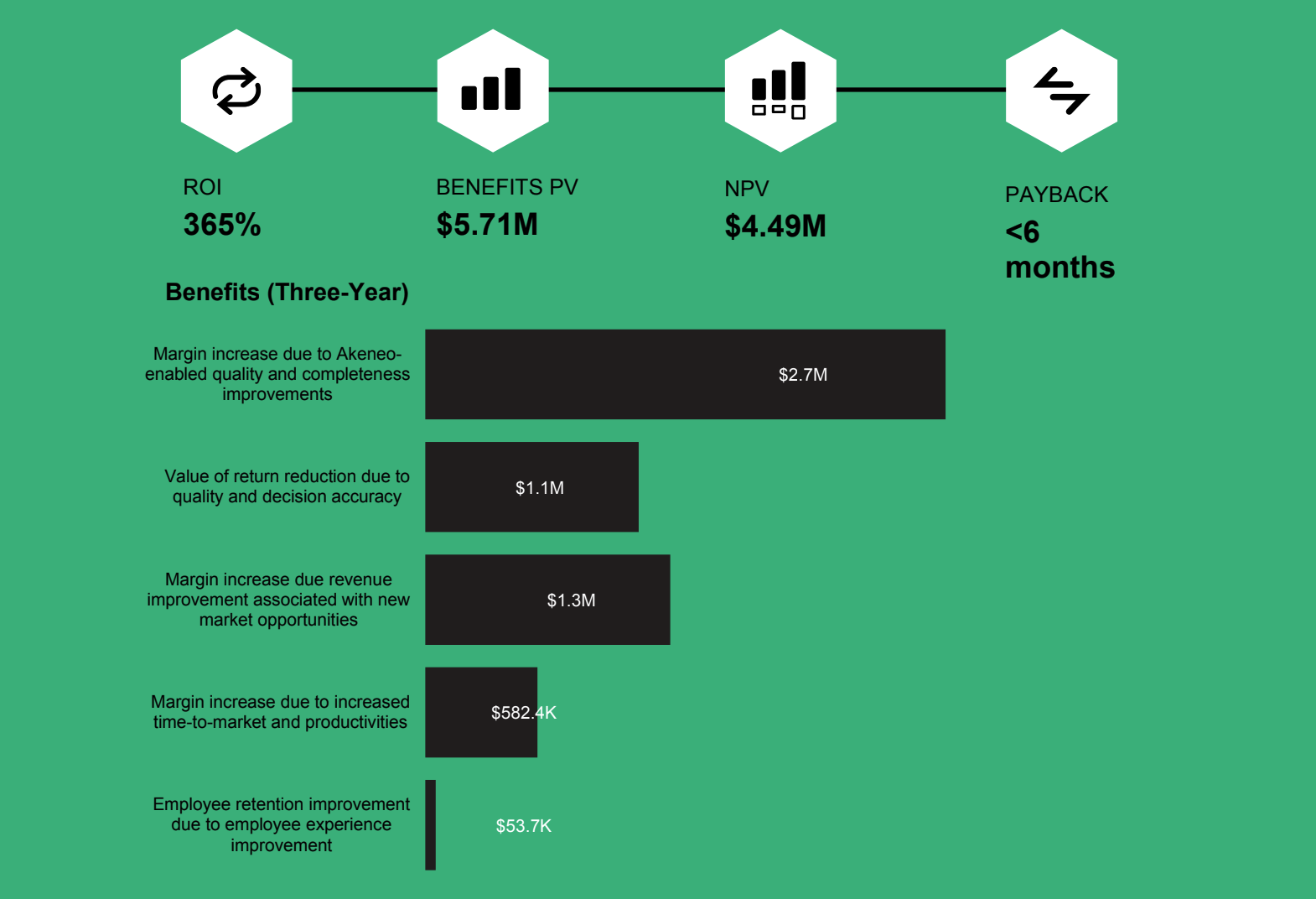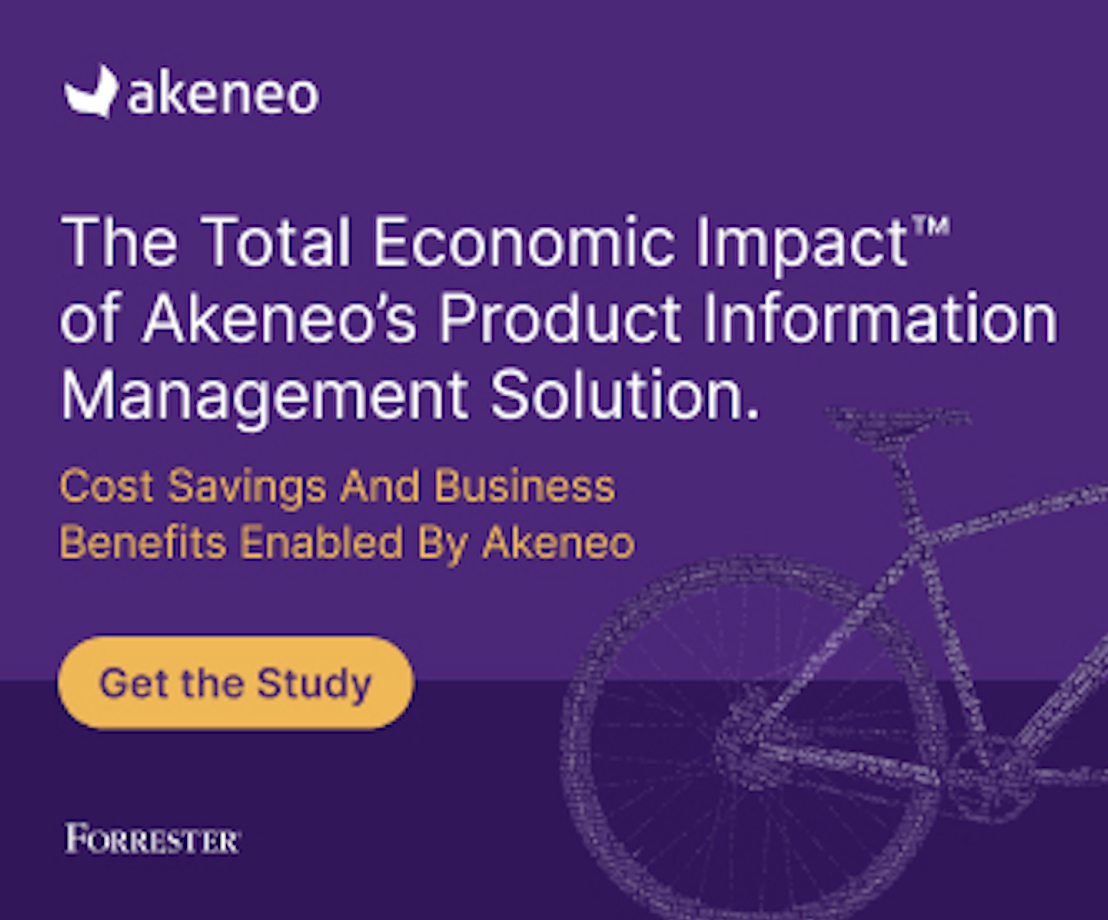This past year, Akeneo commissioned Forrester Consulting to conduct a Total Economic Impact (TEI) study to quantify results that existing Akeneo PIM customers have seen in order to provide a better understanding of the benefits, costs, and risks associated with an investment in PIM technology.

Keywords
One of the most frequently asked questions we get here at Akeneo is about the return on investment (ROI) that organizations may realize by implementing a PIM solution. That’s why we commissioned Forrester Consulting this past year to conduct a Total Economic Impact (TEI) study to quantify results that existing Akeneo PIM customers have seen to provide those interested with a framework to evaluate the potential financial impact of Akeneo’s PIM solution on their organizations.
For the purposes of the study, Forrester collected and aggregated feedback from a number of representatives with experience using Akeneo’s PIM solution in order to better understand the benefits, costs, and risks associated with this investment.
The results were astounding; for a full breakdown, you can download the report here, but let’s dive into a cursory view of a few key issues that these organizations were facing, and how they used Akeneo’s PIM software to help.
Many of the interviewees noted how their organizations struggled with common challenges, including:
Without a PIM solution in place (or an inefficient, outdated PIM system), many organizations saw product data scattered everywhere. Some data is stored in the ERP, in legacy technology, or even in random spreadsheets, meaning that multiple departments had different parts of the product record. Users faced constraints on available fields, field sizes, product categorizations, and organizing product data for intended product data users.
Duplicate effort occurred in maintaining the data and excess effort occurred accessing the data. Ensuring data quality was not possible, so inaccurate input was not caught and departments frequently had common data that conflicted.
With no central repository of product data, organizations struggled with:
The report also uncovered that many organizations felt that they lacked the combination of resources, technical skills, and nimbleness to respond to new market opportunities.This meant that teams were slow to respond to new markets and channels, and struggled to take advantage of new revenue streams. This hampered not only their ambitions to expand selling channels, but also bottle-necked the number of products they were able to sell through various sales channels and approaches, such as upselling, cross-selling, selling by product groupings, and product rankings.
This also meant that distributors were losing new product placement opportunities because competitors were able to provide new product information to retailers and eCommerce partners faster than they were able to.
Several organizations interviewed stated that product managers were being forced to spend a large amount of time on inefficient activities such as collecting and managing product data, which in turn led to inefficient activities to activate that data with channel partners or with their own catalogs and eCommerce systems. Creating redundant work for these product catalog managers meant that they were spending more time hunting down and organizing product information (or even worse, creating it from scratch when it already existed somewhere) instead of utilizing their precious time in a better way.
Do any of these struggles ring a bell? Good news is you’re not alone - the better news is that Akeneo PIM can help. Our easy-to-use interface and administrative workflows meant that we were able to provide these organizations with complete and accurate product information and an easier process for internal and external product data communication.

In particular, the Forrester report found that, after implementing Akeneo PIM:
With a centralized system of product information, organizations interviewed were able to expand the number of products sold and facilitate new product adoption sooner due to an improved time-to-market (TTM). In addition, Akeneo PIM offered a single source of record for all teams and product managers to reference and utilize, leading to more value-add work, more new products, and more innovative products. With complete and accurate product information, distributors gained a competitive advantage as they were able to enter new markets faster and smoother.
We believe that our sales growth has been 2x higher than our competitors over the last two years and we contribute a significant amount of credit to the product experience transformation that Akeneo enabled.
The ability to centrally store and manage all product information allows organizations to improve the experience for managing data and supports better insights into data quality. This also enables these organizations to supply all their sales and marketing channels more easily with rich, search-engine-optimized (SEO) product information that leads to improved product performance on partner and eCommerce sites.
This also means less redundant work for product managers; when they are able to trust that their product data is accurate and up-to-date, they spend less time double-checking the information and more time on valuable activities. Lastly, improved data quality and management means that organizations were able to open new streams of revenue through additional cross-selling and upselling practices.
One of the biggest killers to revenue and hinderances to growth is returned products, and ambiguous product information is one of the top reasons customers return online purchases. By improving product information completeness and quality using Akeneo PIM, the organizations that were interviewed for the report experienced a reduction of returns, leading to operational savings related to the shipping and handling costs of the returns as well as any discounting or write-offs associated with the returned items.
When customers know what they ordered and receive the product they expected to receive, they are far less likely to make the return and far more likely to come back again as a repeat customer.
At the end of the day, Akeneo PIM provides an easy-to-use interface for organizations to centralize, manage, optimize, and communicate their product information across internal and external teams, saving these businesses time, money, and resources.
For a deeper analysis of these results and more fascinating insights into how PIM can revolutionize your business, be sure to download the Total Economic Impact Report of Akeneo’s PIM in its entirety today, or reach out to an Akeneo expert to see how you can get started.


The circular economy presents a powerful opportunity for businesses to align sustainability with profitability by minimizing waste, maximizing...
Read more
Discover what makes Akeneo more than just a workplace. From fostering a culture of care and work-life balance to providing opportunities for growth...
Read more
2024 has been a year to remember for Akeneo. For the third day of PXMas, we’re sharing the stories behind just a few of the prestigious awards...
Read more